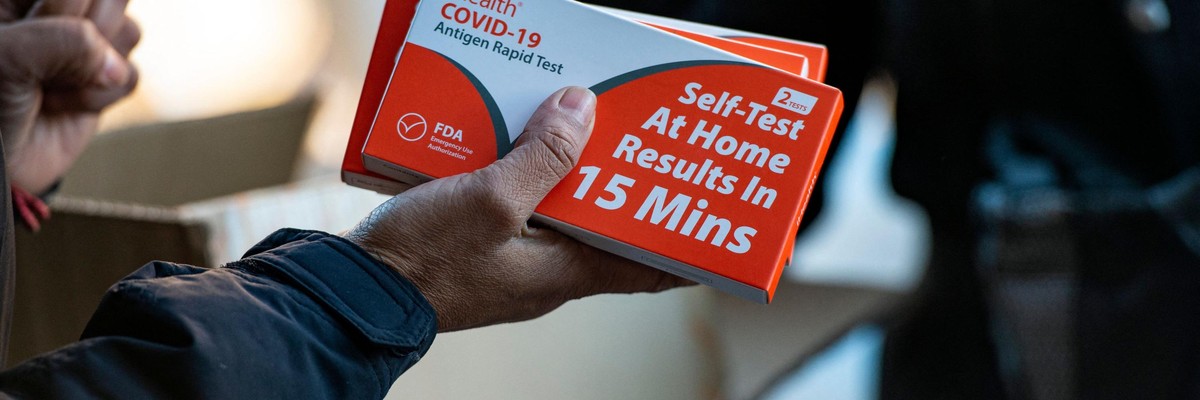Public health advocates on Monday warned that the imminent suspension of the Biden administration's free at-home Covid-19 test program could lead to the autumn and winter surge in infections that officials have feared for months, and denounced the obstruction of Republicans who have refused to pass continued Covid-19 relief this year--even as they've approved hundreds of billions of dollars in military spending.
"It is unfortunate, if unsurprising, to watch Covid become yet another illness inadequately covered by a faulty and fragmented financing system."
"Well this is quite exactly the wrong thing to do going into fall/winter," Dr. Taison Bell, an infectious disease physician at University of Virginia, tweeted as the White House announced on its test-ordering website that a lack of congressional funding has forced the government to end shipments of free tests for the time being.
The federal portal notes that shipments "will be suspended on Friday, September 2 because Congress hasn't provided additional funding to replenish the nation's stockpile of tests."
The White House earlier this year requested $22 billion in coronavirus funding, including $5 billion in global aid to help people across the Global South and prevent new variants from spreading, but Republicans and Democrats were only able to agree on a $10 billion deal excluding global spending. That bill has so far failed to pass.
The government has sent out more than 600 million tests so far, allowing households to place up to three orders since the program began in January under pressure from public health advocates. The Department of Defense said in February that the federal government spent roughly $2 billion on the first shipments of tests.
While Republicans have refused to fund continued Covid spending this year, lawmakers from both parties have agreed to prioritize military spending, including nearly $3 billion in long-term aid for Ukrainian forces that was approved last week, a $40 billion Ukraine package that passed in May, and $782 billion in U.S. military funding that was approved in March--days after the Covid relief was pulled from omnibus legislation.
MSNBC journalist Ayman Mohyeldin on Sunday noted the contrast between the supposed "lack" of funding for relatively inexpensive Covid-19 tests and the availability of hundreds of billions of dollars in defense spending.
According to CBS News, the Biden administration is holding back its stockpile of Covid-19 tests until later in the year to prepare for what a senior official called a potential "new rise in infections and more acute need."
Experts say a winter surge in infections could result in a million hospitalizations and nearly 200,000 deaths in a worst-case scenario.
Advancing Health Equity founder Dr. Uche Blackstock noted that through the fall, sites such as libraries and community health centers will still be distributing free Covid tests in some areas, but noted that "the convenience of ordering the tests online was invaluable."
A funding lapse is also likely to happen with vaccines, Blackstock said.
Though Republicans have obstructed the passage of continued Covid-19 relief including funding for the test program, the White House has also expressed some eagerness to end the federal government's oversight of the coronavirus pandemic.
Earlier this month, White House Covid-19 Response Coordinator Dr. Ashish Jha said at a U.S. Chamber of Commerce Foundation event that the Biden administration hopes to get "out of that acute emergency phase where the U.S. government is buying the vaccines, buying the treatments, buying the diagnostic tests."
"My hope is that in 2023, you're going to see the commercialization of almost all of these products," Jha said. "Some of that is actually going to begin this fall, in the days and weeks ahead. You're going to see commercialization of some of these things."
The Centers for Disease Control and Prevention's Operation Expanded Testing program, which provides tests to schools, will end on December 31, and pharmaceutical company Eli Lilly has begun direct commercial sales of its monoclonal antibody treatment to hospitals and states.
The CEOs of Moderna and Pfizer have alluded to raising the prices of their vaccines once they are being sold in a "private market situation" rather than to the federal government.
Harvard Medical School professor Dr. Adam Gaffney wrote in The New Republic last week that the coming "commercialization" of Covid-19 treatments, tests, and vaccines will sharply reduce access, leading to increased risks for public health.
"Some Medicaid patients could see co-pays for Covid vaccines once they are commercialized--or not have access to these vaccines at all, according to a report from the Brookings Institute," Gaffney wrote. "Provision of vaccines to the uninsured, who are at increased risk of Covid, will almost certainly deteriorate when neither administration nor the products themselves are publicly funded. And co-pays and deductibles for treatments like Paxlovid will presumably pop up for the privately insured."
"The partial decommercialization of the financing of Covid care was a departure from business as usual for American healthcare," he added. "So it is unfortunate, if unsurprising, to watch Covid become yet another illness inadequately covered by a faulty and fragmented financing system."

